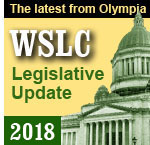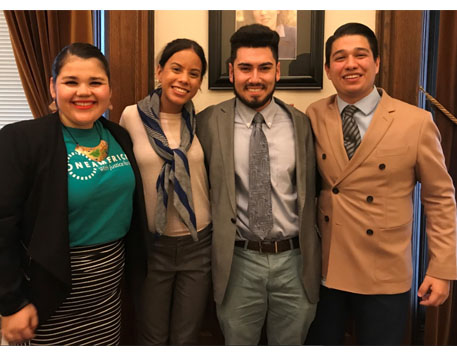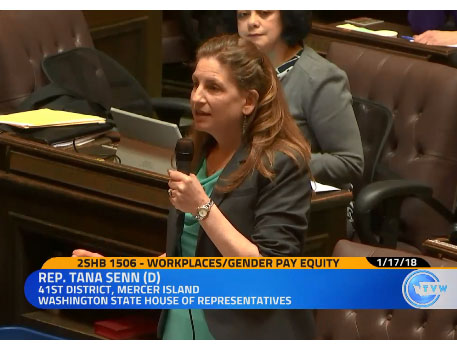STATE GOVERNMENT
What’s alive and what’s dead-ish in Olympia (Leg. Update)
A status report on pro-worker legislation after Wednesday’s cutoff
 OLYMPIA (Feb. 16, 2018) — Wednesday was the cutoff deadline for bills to advance from their houses of origin. If it didn’t get a floor vote by the end of that day, it died.
OLYMPIA (Feb. 16, 2018) — Wednesday was the cutoff deadline for bills to advance from their houses of origin. If it didn’t get a floor vote by the end of that day, it died.
But then, nothing is ever really dead in Olympia. Bills deemed “necessary to implement the budget” are exempt from cutoffs. Plus, legislators can resurrect bills by various extraordinary procedural means, including by amending the language into bills that remain alive, or… well, you get the picture.
That said, here’s a roundup of some key working family bills and where they stand after Wednesday’s cutoff. This is not a comprehensive list. There are many other bills upon which the Washington State Labor Council, AFL-CIO has taken a position. These updates are on bills that are part of the WSLC’s Shared Prosperity Agenda or were previously described in this newsletter and at The Stand.
Bills that SURVIVED cutoff
The following bills successfully passed from their houses of origin before Wednesday’s cutoff:
BREAKFAST AFTER THE BELL (HB 1508, sponsored by Rep. Monica Stonier, D-Vancouver) — Kids needs reliable, healthy breakfasts at the start of the school day to ensure they are ready to learn. By providing all of our school children adequate nutrition, we can start to close the achievement gap and ensure that kids experiencing poverty are not stigmatized. Passed the House 83-15; passed the Senate 43-5.
 DREAM ACT 2.0 (HB 1488, Rep. Drew Hansen, D-Bainbridge Island) — This would ensure that undocumented students brought to the U.S. and Washington state as children can continue their college educations, even if President Trump succeeds in his effort to kill the Deferred Action for Childhood Arrivals program. HB 1488 would allow undocumented students who meet certain criteria to continue to qualify for the state’s College Bound Scholarship program, even if DACA ends. Passed the House 56-42; scheduled for public hearing Feb. 20 in Senate Higher Education & Workforce Development.
DREAM ACT 2.0 (HB 1488, Rep. Drew Hansen, D-Bainbridge Island) — This would ensure that undocumented students brought to the U.S. and Washington state as children can continue their college educations, even if President Trump succeeds in his effort to kill the Deferred Action for Childhood Arrivals program. HB 1488 would allow undocumented students who meet certain criteria to continue to qualify for the state’s College Bound Scholarship program, even if DACA ends. Passed the House 56-42; scheduled for public hearing Feb. 20 in Senate Higher Education & Workforce Development.
DISCLOSE ACT (SB 5991, Sen. Andy Billig, D-Spokane) — Dark money (secret political spending) in our elections is poisoning our politics. The Legislature should make sure that political money spent through front groups is publicly disclosed. SB 5991 passed the Senate 32-17; scheduled for action Feb. 16 in House State Government Committee.
ELECTRICAL APPRENTICESHIPS (SB 6126, Sen. Rebecca Saldaña, D-Seattle) — This legislation supported by the IBEW requires completion of an apprenticeship program to receive a journey level electrician certificate of competency. It passed the Senate 44-5; scheduled for a public hearing Feb. 19 in House Labor and Workforce Standards.
 EQUAL PAY OPPORTUNITY ACT (HB 1506, Rep. Tana Senn, D-Mercer Island) — Updates the state’s Equal Pay Act (for the first time since 1943) to prohibit employers from imposing pay secrecy policies; to ensure accessibility for low- and high-income employees, and small and large businesses, to remedies through administrative and civil pathways; and to prevent discrimination by gender in providing career advancements opportunities. It passed the House 69-28; passed Senate Labor & Commerce; and is now on the Senate’s 2nd Reading Calendar.
EQUAL PAY OPPORTUNITY ACT (HB 1506, Rep. Tana Senn, D-Mercer Island) — Updates the state’s Equal Pay Act (for the first time since 1943) to prohibit employers from imposing pay secrecy policies; to ensure accessibility for low- and high-income employees, and small and large businesses, to remedies through administrative and civil pathways; and to prevent discrimination by gender in providing career advancements opportunities. It passed the House 69-28; passed Senate Labor & Commerce; and is now on the Senate’s 2nd Reading Calendar.
FACULTY COLLECTIVE BARGAINING (HB 1237, Rep. Mike Sells, D-Everett) — Community and technical colleges should be allowed to utilize local funding sources in negotiations with faculty over wages and benefits, like four-year colleges do. Access to these local funds will help our CTCs recruit and retain top faculty. Passed the House 57-41; now in Senate Labor & Commerce (may advance on Thursday).
FAIR CHANCE ACT (HB 1298, Rep. Lillian Ortiz-Self, D-Mukilteo) — When formerly incarcerated persons have fulfilled their debt to society, they should be able to secure work. By “banning the box” and waiting until after an interview to ask about criminal history, they will have a fair chance to make their case to potential employers. HB 1298 passed the House 52-46; scheduled for a public hearing Feb. 19 in Senate Labor & Commerce.
HANFORD OCCUPATIONAL DISEASE (HB 1723, Rep. Larry Haler, R-Richland) — Hanford workers are exposed to unknown combinations of dangerous chemicals and radioactive materials. By adopting a presumption in our workers’ compensation law that certain cancers and other illness are due to exposure to these hazards, the people of Washington will commit to helping these heroic men and women. Passed House 76-22; passed Senate 35-14. It awaits a concurrence vote in the House.
 HOSPITAL WORKER BREAKS AND OVERTIME (HB 1715, Rep. Marcus Riccelli, D-Spokane) — Healthcare facilities should ensure that nurses and healthcare technical workers are guaranteed access to the breaks and overtime they have earned. This will ensure those providing the best care are healthy, rested, and less prone to mistake-causing fatigue. Passed the House 56-42; scheduled for action Feb. 19 in Senate Labor & Commerce.
HOSPITAL WORKER BREAKS AND OVERTIME (HB 1715, Rep. Marcus Riccelli, D-Spokane) — Healthcare facilities should ensure that nurses and healthcare technical workers are guaranteed access to the breaks and overtime they have earned. This will ensure those providing the best care are healthy, rested, and less prone to mistake-causing fatigue. Passed the House 56-42; scheduled for action Feb. 19 in Senate Labor & Commerce.
LEGAL FINANCIAL OBLIGATION REFORM (HB 1783, Rep., Jeff Holy, R-Cheney) — By breaking the prison-to-debt-to-prison cycle, the Legislature can help formerly incarcerated people secure a productive future, and pay restitution to victims. Changing how the costs of jail and prison are paid and calculated can be the difference between recidivism and reform. Passed the House 86-12; passed Senate Law & Justice.
PESTICIDE DRIFT (SB 6529, Sen. Rebecca Saldaña, D-Seattle) — Creating a work group to review existing state and federal laws regulating pesticide safety and application to make sure farmworkers and surrounding communities are protected from harmful pesticide drift. The group will report its findings to the Legislature this fall. Passed Senate 45-2; scheduled for public hearing Feb. 21 in House Health Care & Wellness.
TAXPAYER ACCOUNTABILITY ACT (HB 1851, Rep. Laurie Dolan, D-Olympia) — This bill would introduce some common-sense standards to increase transparency and accountability when a state agency considers outsourcing public work. Passed the House 52-45.
 WASHINGTON VOTING RIGHTS ACT (SB 6002, Sen. Rebecca Saldaña, D-Seattle) — This legislation creates a path for local governments to change discriminatory voting systems without the need for costly lawsuits. Passed the Senate 29-19; passed House State Government.
WASHINGTON VOTING RIGHTS ACT (SB 6002, Sen. Rebecca Saldaña, D-Seattle) — This legislation creates a path for local governments to change discriminatory voting systems without the need for costly lawsuits. Passed the Senate 29-19; passed House State Government.
WORKERS’ COMP SOCIAL SECURITY OFFSETS (HB 1336, Rep. Steve Kirby, D-Tacoma) — As retired workers return to the workforce part-time to make ends meet, work injury rates among older workers have increased. HB 1336 would end the practice of offsetting time-loss wage replacement for injured workers who also collect Social Security benefits, as these workers already face financial challenges. Passed the House 65-33; scheduled for action today in Senate Labor & Commerce.
Bills that MISSED cutoff
Among the pro-worker bills that failed to get floor votes before Wednesday’s cutoff were:
 KEEP WASHINGTON WORKING (SB 5689) — Immigrants are integral to our state’s thriving economy — as workers, small business owners, and entrepreneurs. By working with the Department of Commerce, labor, business and advocacy groups can develop strategies to help support them, while establishing statewide guidelines that prevent unconstitutional detention and profiling. Passed both the Senate Labor & Commerce and Ways & Means committees, but died in Rules.
KEEP WASHINGTON WORKING (SB 5689) — Immigrants are integral to our state’s thriving economy — as workers, small business owners, and entrepreneurs. By working with the Department of Commerce, labor, business and advocacy groups can develop strategies to help support them, while establishing statewide guidelines that prevent unconstitutional detention and profiling. Passed both the Senate Labor & Commerce and Ways & Means committees, but died in Rules.
SB 5689 was strongly supported by Washington Education Association, Northwest Immigrant Rights Project, Washington Tree Fruit Association, Hospitality Association, and others. WTFA President Jon DeVaney wrote:
“Some have mistakenly described this as a ‘sanctuary’ policy. However, most Americans understand sanctuary policies to be a willful refusal to follow or enforce the law, rather than a ‘comply but do not volunteer for more’ approach as proposed in SB 5689. This should hardly be controversial and is far from unusual. Every farm or business would cooperate with a regulatory enforcement investigation on labor, environmental, or other issues, but neither would they volunteer extraneous information…
“Washington’s tree fruit producers will continue to press Congress and the Administration to enact meaningful reforms to our broken immigration system. They will also continue to support compliance with immigration law, as growers have always complied with laws and regulations that aren’t working even while seeking to change them. But until that reform takes place, the ‘comply but don’t volunteer’ approach may be the best chance of averting disaster for labor-intensive agriculture and of the rural Washington economy.”
NONCOMPETE AGREEMENTS (HB 2903, Rep. Derek Stanford, D-Bothell; plus SB 6522/SB 6526) — Legislation to regulate and restrict noncompetition agreements, which are binding legal documents are used to restrict workers’ ability to change jobs, while protecting legitimate intellectual property concerns of businesses. HB 2903 passed House Labor & Workforce Standards; but died in Rules.
RAILROAD STAFFING (HB 1669) — To prevent devastating fatigue-caused train derailment accidents, railroad companies should have to meet minimum staffing levels, especially for trains containing hazardous materials. Passed House Labor & Workforce Standards, but died in Rules.
Town Hall meetings this weekend
 Many state legislators are holding town hall meetings in their districts this weekend. Union members are urged to attend the meetings in their communities and ask about some of the pro-worker bills listed above. Here are the Town Hall schedules:
Many state legislators are holding town hall meetings in their districts this weekend. Union members are urged to attend the meetings in their communities and ask about some of the pro-worker bills listed above. Here are the Town Hall schedules:
House Democrats
Senate Democrats
The House and Senate Republican caucuses have not posted a schedule of town hall meetings online. Calls to both caucuses seeking this information were not returned.
We are trying not to take this personally.





